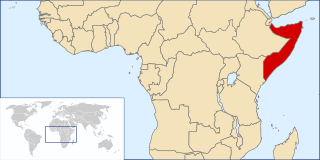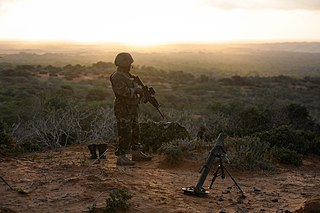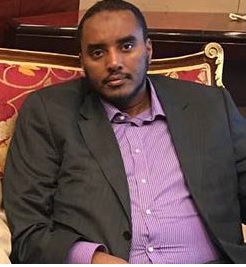Related Research Articles

The Second Battle of Mogadishu was a battle fought for control of Somalia's capital city, Mogadishu. The opposing forces were the Alliance for the Restoration of Peace and Counter-Terrorism (ARPCT), and militia loyal to the Islamic Courts Union (ICU). The conflict began in mid-February 2006, when Somali warlords formed the ARPCT to challenge the ICU's emerging influence. The ICU's influence was largely generated by wealthy financial donors who sought to enable the Islamic Courts Union to seize power in the country to bring stability. The battle is referred to as the Second Battle to distinguish it amongst the nine major Battles of Mogadishu during the decades-long Somali Civil War.
After two decades of violence and civil war and after the Transitional Federal Government (TFG) of Somalia captured Mogadishu and Kismayo, the TFG attempted to disarm the militias of the country in late 2006. According to the UN/World Bank's Joint Needs Assessment (JNA) coordination secretariat, "the total estimated number of militias [militia members] to be demobilized is 53,000." In 2005, they estimated that "there are 11–15,000 militia people controlling Mogadishu ."
The timeline of events in the War in Somalia during 2006 is set out below.

The timeline of events in the War in Somalia during 2007 is set out below.

Shabelle Media Network (SMN) is a radio and television news organization based in Mogadishu, Somalia.

Mass media in Somalia includes various radio, television, print and internet outlets. The federal government operates two official radio and TV networks, which exist alongside a number of private and foreign stations. Print media in the country is progressively giving way to news radio stations and online portals, as internet connectivity and access increases. In February 2013, the Ministry of Information, Posts and Telecommunication also launched a broad-based consultative process for the reformation of media legislation.
Mustafa Haji Abdinur is a Somali journalist and radio correspondent. He was awarded a CPJ International Press Freedom Award by the Committee to Protect Journalists in 2009.

The 2009 Hotel Shamo bombing was a suicide bombing at the Hotel Shamo in Mogadishu, Somalia, on 3 December 2009. The bombing killed 25 people, including three ministers of the Transitional Federal Government, and injured 60 more, making it the deadliest attack in Somalia since the Beledweyne bombing on 18 June 2009 that claimed more than 30 lives.
Sheikh Nur Mohamed Abkey was a Somalian journalist killed in the line of duty. Abkey worked for Radio Mogadishu-Voice of Somali Republic in Somalia's capital city. He had a long career as a journalist and worked under difficult conditions during the last two decades of his career.
Abukar Hassan Mohamoud, also known as Kadaf, was a Somali activist and the manager/director for the independent Somaliweyn Radio in Mogadishu, Somalia. At the time of his murder, he had been working on a re-launch of Radio Somaliweyn, which had been attacked and looted by Al-Shabaab in 2010.
Ali Iman Sharmarke was a Somalian and Canadian journalist and philanthropist. He was a co-founder of HornAfrik Media Inc, the first independent radio network to have its headquarters in Mogadishu, Somalia. In 2007, he was killed by a roadside bomb. Sharmarke was posthumously awarded the CJFE's International Press Freedom Award and Tara Singh Hayer Award for his journalistic work. His family also established the Sharmarke Peace Foundation in his memory.
HornAfrik Media Inc, a defunct news organization based in Mogadishu, was subjected to various attacks by militants during the Islamist insurgency (2006-2009) in southern Somalia. Prior to the company's closure in 2010, these incidents included:

This is a 2014 timeline of events in the Somali Civil War (2009–present).

Operation Indian Ocean was a joint military operation between the Somali military, AMISOM and the United States military against the Al-Shabaab militant group aimed at eliminating the remaining insurgent-held areas in southern Somalia. It officially began in August 2014.

This is a 2015 timeline of events in the Somali Civil War (2009–present).

Fahad Yasin Haji Dahir,, commonly known only as Fahad Yasin, is a Somali civil servant and politician, as well as a former journalist. He was also the campaign manager for Mohamed Abdullahi Mohamed "Farmaajo" in the 2017 elections. After the elections, he was appointed Chief of Staff for Villa Somalia and then Director General of the National Intelligence and Security Agency (NISA). Farmaajo subsequently appointed him as his national security advisor.

Hindia Haji Mohamed,, a Somali broadcast radio and TV journalist and producer for Radio Mogadishu and Somali National Television in Mogadishu, Somalia, was one of the many journalists killed during the Somali Civil War. She and her husband Liban Ali Nur were both among the assassinated journalists making them among the few married couples worldwide killed.
Ali Ahmed Abdi was a Somali journalist who worked for Radio Gaalkacyo. He worked in the station for three years as head of programs, until his untimely death by shooting with the insurgent group Al-Shabaab claiming responsibility.
In Somalia, freedom of speech and freedom of the media is guaranteed under the Somali Constitution established when the Federal Government was established in 2012. However, while there are swathes of blogs along with nearly 100 established media outlets, the culture of journalism has been violated with violence, arbitrary arrests, persecution, and suppression of the media.
References
- 1 2 "Radio journalist gunned down in Mogadishu". www.aljazeera.com.
- 1 2 "Somali journalist gunned down in Mogadishu". Reuters. October 19, 2007 – via www.reuters.com.
- 1 2 3 4 "Media watchdogs denounce death of Somali reporter". Reuters. October 20, 2007 – via www.reuters.com.
- 1 2 "Somali journalist gunned down in Mogadishu". Archived from the original on March 28, 2014.
- ↑ "Radio Shabelle manager assassinated". cpj.org. 19 October 2007.
- 1 2 "Garowe Online". Archived from the original on October 21, 2007.
- ↑ "The Journalists' Memorial". Archived from the original on 2012-01-27. Retrieved 2012-02-05.
- ↑ "10News - Status". Archived from the original on 2013-01-16. Retrieved 2012-02-05.
- ↑ "Explore CPJ's database of attacks on the press". cpj.org.
- ↑ Staff Reporter (23 October 2007). "Rights group chides Somali govt for media abuses". The M&G Online.
- ↑ "allAfrica.com: Somalia: Murder of the Head of Radio Shabelle in Mogadishu".